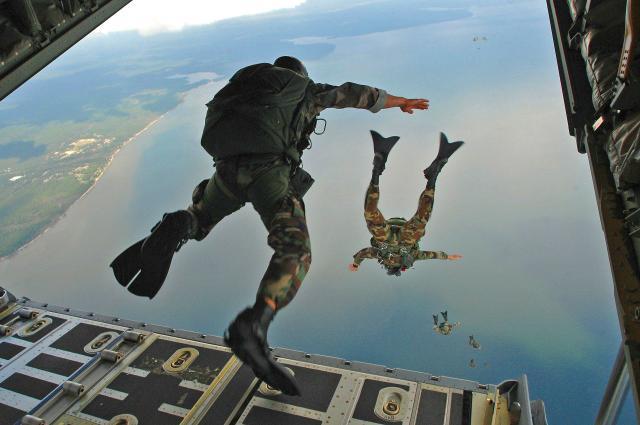Diplomats, Engineers, and Meteorologists: The Unknown Specialties of U.S. Special Ops

When people hear "U.S. special operations forces" they tend to imagine tough, superhuman, soldiers. The Hollywood image of these individuals is deceiving — a stereotype that only captures a minority of officers in the special operations forces (SOF), which is based in the Office of Strategic Services. Along with dispelling myths like this, Colonel Frank Sobchak explores the history and importance of the U.S. Special Operations Forces in his course SEALs, Snake Eaters, and Air Commandos: The Secret History of U.S. Special Operations Forces, which he is teaching as a Robyn Gittleman Graduate Teaching Fellow.
With an academic background in Military History and Arab Studies, Colonel Sobchak is currently a PhD candidate at the Fletcher School with concentrations in Security Studies and Political Studies. He embodies experiential learning, having served for twenty-two years in the US Army Special Forces, followed by four years as a Congressional liaison. As a special staff representative, he worked directly with members of Congress and defense-related congressional committees, explaining what the U.S. Special Operations Command is while defending its position. In his time working for the government, Colonel Sobchak met a diverse group of people from many different backgrounds in the SOF.
As the enforcers of American defense policy on the international stage, the U.S. special operations forces are one of the most secretive agencies in the country. It can come as a surprise to hear how many different types of people and professions make up the SOF, since the thought of the agency usually conjures images of conflict and combat missions. However, the SOF requires skills for nation-building, reconstruction, language, diplomacy, civil affairs, psychological operations, and civic action. Interestingly, meteorology is also important – an inaccurate weather report is what caused the rescue attempt in the Iranian hostage crisis to fail. These aspects, though lesser known, are critical to the operations of the SOF, and Colonel Sobchak emphasizes them in his course.
Each lesson centers around an important time period in the history of the special operations forces, beginning with early examples and leading up to 9/11. Colonel Sobchak’s connections provided opportunities for the class to hear from guest lecturers, such as veteran Bill Givens, a member of the SOF, who ran guerrilla operations during the Korean War.
The semester cumulates in a practical final exercise. Students will be presented with a conflict in a country that necessitates U.S assistance. "Members of the class will be assigned different duties as part of a special operations task force," Colonel Sobchak explains. "All of the branches of U.S. special operations forces will be represented, and the practical exercise will build on what they have learned across the semester about those units and their capabilities, roles, and missions." After researching their assigned duty, students will participate in an in-class debate over where to deploy their resources. Like a real diplomatic situation, students’ decisions will have an impact on the events in the scenario. Stepping into the shoes of SOF officers, students will navigate a national defense scenario first hand.
In a time when tensions run high in a complex world, the U.S. special operations forces will likely play an important role both nationally and globally. "There are considerable societal, technological, and geostrategic changes occurring in the world," Colonel Sobchak says. "Students should understand how those impact special operations forces and be able to discuss how U.S. forces should change and adapt to meet those challenges."
About the Author
Kaycee Feldman is a first-year student planning to earn a double major in Astrophysics and Film & Media Studies. Hailing from the small town of Doylestown, Pennsylvania, just outside of Philadelphia, she is highly interested in both the arts and sciences and how they can overlap. When not writing for the ExCollege, she can instead be found writing science fiction and horror stories that she intends to convert into screenplays.